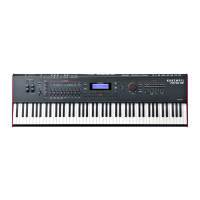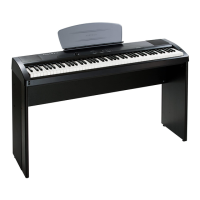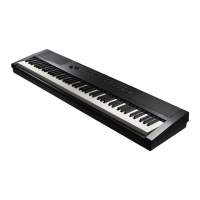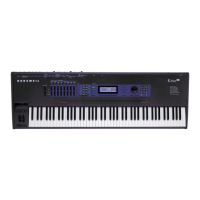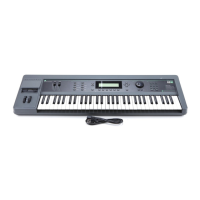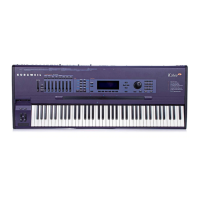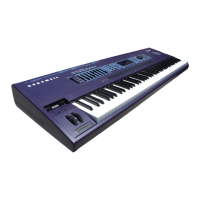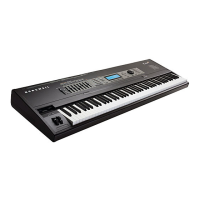Program Edit Mode
Editing VAST Programs With KVA Oscillators
3-75
Anti-Aliased Oscillators Aliased Oscillators
Size Name/Type Size Name/Type
1 Block LPNOIZ (noise + low pass lter) 1 Block SINE
2 Blocks SINE SAW
SINE+ TRI
SAW SQUARE
RES NOISE (noise + low pass
lter with resonance)
NOISE
SQUARE SINE+
3 Blocks PWM (Pulse Width Modulation) SAW+
4 Blocks SYNC SAW NOISE+
SUPER SAW SW+SHP (Sawtooth + Shaper)
TRIPLE SAW 2 Blocks SHAPED SAW
8 Blocks SYNC SQUARE (master) >>,
>>SYNC SQUARE (slave)
(4 blocks each)
PWM (Pulse Width Modulation)
Setting Up The Sync Square Oscillator
e Sync Square oscillator is actually comprised of two oscillators, a master and a slave, set
up to emulate the way sync square oscillators worked on classic analog synthesizers. To create
a program using Sync Square, select Program 2046 Editor Template. Select “none” on the
KEYMAP page. Select “user” on the AMP ENV page for an amp envelope. On the ALG
page, select Algorithm 5 at the top of the page. Use the cursor buttons to select the function
block and use the alpha wheel to select the “SYNC SQUARE (master) >>” function. Next,
press the << soft button to change soft button pages until you see “DupLyr.” Press DupLyr to
duplicate the layer, creating layer 2. In layer 2, on the ALG page, change the function block
to “>> SYNC SQUARE (slave)”, and set the Alt Input parameter to “Layer 1.” e nal step
is to go to Layer 1’s DSP CTL page and turn the Level parameter all the way down, to -96dB
(this ensures that you will only hear the output of the slave oscillator on layer 2, which is the
intended function of Sync Square).
Now the Sync Square oscillator should be working. e “Synco” parameter, Sync Oset, is
the main parameter for shaping the tone of this sound. Synco sets the sync oset between
the master and slave square waves in each corresponding oscillator, which changes the shape
of the waveform output by the slave oscillator. e Sync Square oscillator is most expressive
when the Synco parameter is modulated during performance. Use the DSP MOD page to
assign an envelope or continuous controller like the Mod Wheel for this parameter to hear
the eect (see The DSP Modulation (DSP MOD) Page, as well as The DSP Control (DSP
CTL) Page for details on setting up modulation and other ways to control parameters, and
see The Envelope 2 (ENV2) and Envelope 3 (ENV3) Pages for details on using envelopes as
modulation sources). See Advanced Use Of KVA Oscillators below for some similar examples
of how to set and control modulation for oscillator specic functions and other parameters.

